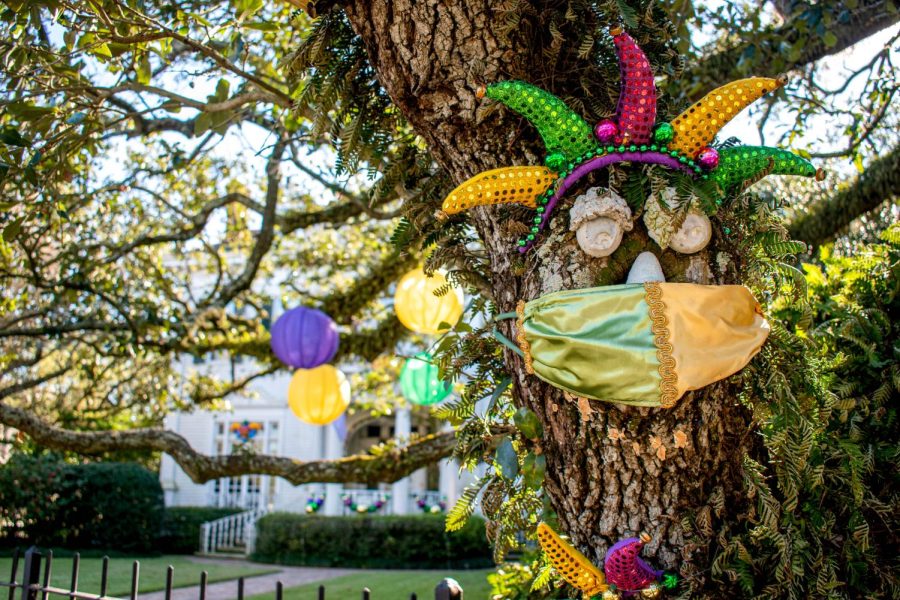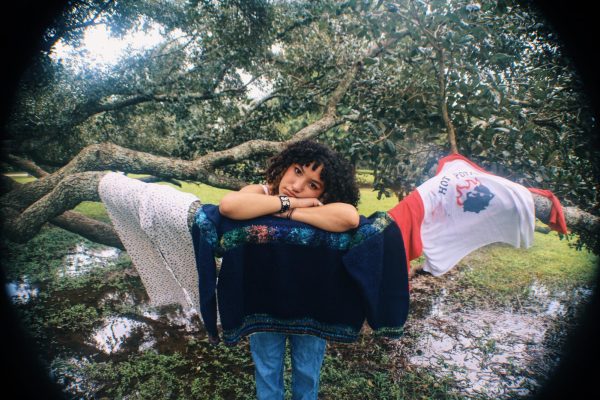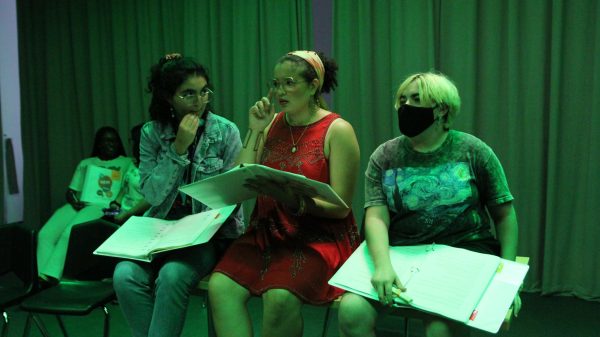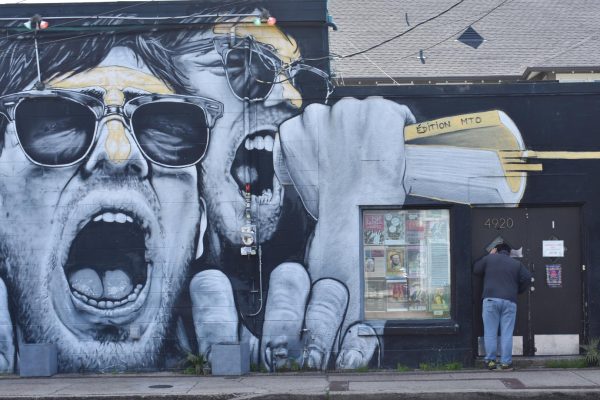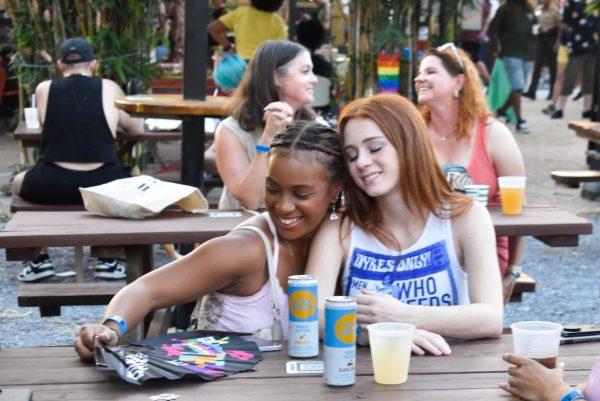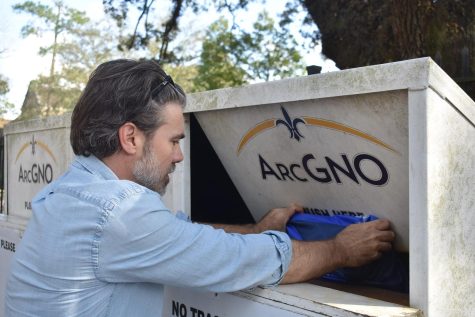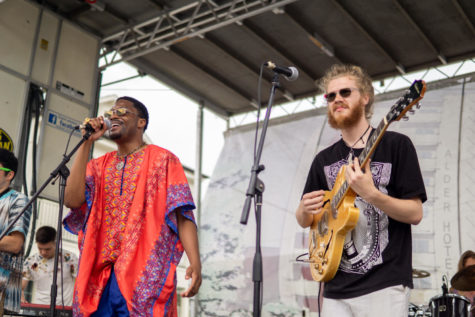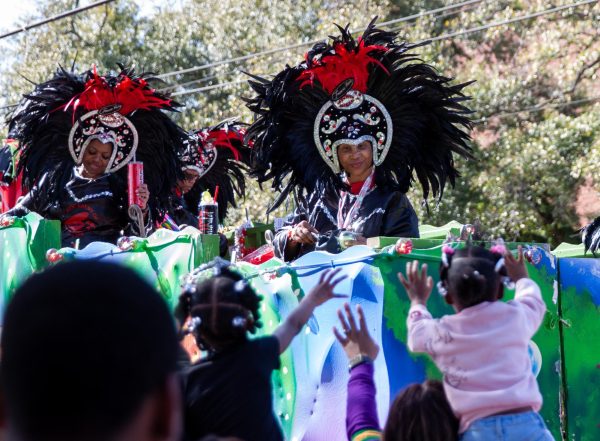New Orleans residents make plans for COVID-safe Mardi Gras
Mardi Gras decorations featuring a face wearing a COVID mask adorns an oak tree on St. Charles Avenue Jan. 22, 2022. House floats are one way that New Orleanians are celebrating carnival season safely.
“Without a doubt, we will have Mardi Gras 2022,” declared Mayor LaToya Cantrell at New Orleans’ annual Kings Day celebration on Jan. 6. While this excited some New Orleanians who have missed the holiday’s in-person celebrations, others are adjusting their carnival traditions as COVID cases surge across the nation.
As Mardi Gras approaches, families, krewes, and businesses alike are making plans to celebrate the season safely.
Loyola political science senior and New Orleans native Tyler Sanchez said his family is taking a step back from Mardi Gras parades this year with the exception of Mardi Gras day.
“Mardi Gras is still going to happen because that’s what the city feels like people need right now,” Sanchez said. “That’s what they want because it’s been so long without it. But then it’s also not going to be the same.”
Sanchez, who serves as Student Government Association vice president, said his participation in parades and large public gatherings during this Mardi gras season will be based on the COVID-19 case numbers in the city when the time comes. Sanchez said that the sense of community is what he and his family value most during the Carnival season.
“For my family in particular, we are together for every holiday and most weekends. As long as we’re able to lean into our community during the season, it will be fine,” he said.
Gene Hernandez, parade rider and 2007 Loyola alumnus, said while there may be questions of how Mardi Gras will be celebrated, it will be celebrated in the end. Hernandez and six other Loyola alumni helped restart the Krewe of Freret which he is a rider in this Carnival season. He also is a float captain and rider in the Krewe of Tucks.
“Mardi Gras happens regardless. It’s on the calendar, but whether the city allows parading is a completely different story,” Hernandez said.
Hernandez said while the Krewe of Tucks has moved some functions around, the krewe is planning to have its coronation ball on Jan. 29 and parade on the streets during carnival season.
Hernandez said the Krewe of Tucks is requiring a negative COVID test or proof of vaccination for members to ride. The krewe is also offering the COVID-19 vaccine to riders right before the parade. Another requirement Tucks has implemented is masking at all times during the parade, and the krewe is providing masks for all its members.
“It’s not that crazy of a concept to be masked on a float. It just used to be a mask above your eyes. This isn’t really a big difference because it’s still hiding your identity,” Hernandez said.
Local designer Kenneth Thompson said designing house floats saved him during the pandemic. Thompson said he began doing house float work on the Northshore when he was contracted out to turn Mandeville City Hall into a float. He said after that he began getting more offers from word of mouth leading him to do other projects such as the Mandeville City Trailhead.
Thompson said he’d previously worked on set design for theatre productions and designed for haunted houses.
Thompson said New Orleans is an art-driven city and house floats have allowed locals to support the artist community in a way that they may not have been able to support before.
“In the past, you see all these floats but you don’t know who does it or really where it comes from. I think that it sheds new light on a new group of people in the city who are very important,” he said.
While Thompson said he hasn’t received any calls this year to work on house floats, he’s hopeful that business will pick up closer to Mardi Gras day.
Loyola alumni Amy Sins is the chef and owner of Langlois Culinary Crossroads, a culinary entertainment space where local chefs give live cooking demonstrations and tell the stories of Louisiana’s most unique food traditions. Sins said the entire Langlois team is vaccinated and completes COVID-19 tests before each private event they host. She said if a team member were to test positive, Langlois has team members on standby to compensate.
“We are fortunate. We’re small and with a group of six people, I only need one chef. So we all are rotating and we’re all available for each other,” she said.
As the 2022 Mardi Gras season shifts back to in-person events, Sins said this month Langlois is still mostly virtual. She said the only in-person events they’ll be putting on are private events with small, close-knit group participants.
“We don’t want to put strangers who don’t know each other in a room together around the food that they’re going to eat,” she said. “Everything that we’re doing this season is focused on small private groups that feel very comfortable together, who were vaccinated and traveling together and constantly in their little bubble.”
She said last carnival season, her business held remote events to keep the spirit of Mardi Gras alive while staying safe including decorating your own king cake parties.
Sins said Langlois has kept the fun of Mardi Gras alive this year as they teach guests how to catch beads while still holding their drinks. She said as a culinary entertainment restaurant business they have been able to transition well to online events by having their storytelling element along with their dining element.
Sins, a member of the Krewe Société Des Champs Elysée, said she felt comfortable parading on twelfth night because everyone had to be masked, tested, and vaccinated to participate. Sins said this experience gave her hope that the city can have a fun and safe carnival season.
“When we got in the building with the band I looked at the captain and said ‘this is the happiest moment I’ve had in two years because this is my New Orleans,” she said “This is what we do and this is what we need to lift our spirits. So if we can have a healthy and safe Mardi Gras, I think that’s what New Orleanians need for us to turn the corner mentally after the last two years.”

Domonique Tolliver is currently the Managing Editor for Digital. She was previously The Maroon's Life & Times Assistant Editor, Worldview Editor and...


